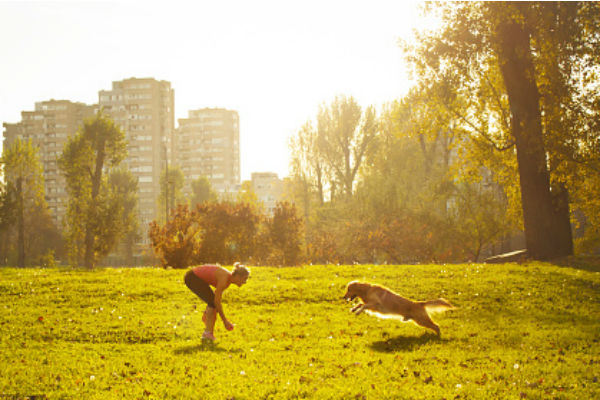“My dog comes to me when we’re at home, but at the park, it’s like I’m not even there!” Could you say this about your dog?
A reliable recall, or “come when called,” might be the most important thing to teach your dog. It can also be hard to teach, usually because we unwittingly sabotage the effort. But it’s simple! The trick is to be irresistible.
Dogs know when they aren’t leashed, and you have no physical control. You must be more fun, more interesting, and more rewarding than whatever he is doing when you call him. Start at home in your daily routine. Anytime he comes to you, whether you called him or not, be happy to see him. Give a treat, praise or play with him. Practice calling him in a distraction-free environment and reward generously when he comes to you. Don’t be stingy with treats for this exercise; a good recall could save your dog’s life. Gradually add distractions. If at any time during the process your dog does not come, take a step back to an easier scenario.
If Rover is in the back yard having a wonderful time chasing squirrels or at the dog park wrestling with his buddies, don’t call him. You probably already know that there is a good chance he’ll ignore you, so don’t give him the opportunity to do so. Instead, take a high value treat and go to him. Show him the treat, take hold of his collar when he comes to get it, then give the treat and cheerfully lead him to where you want to go. If you practice “collar grabs,” this will be easy. Go to the dog, take hold of the collar, give a treat, and let him get back to having fun. This will teach him that avoiding you doesn’t pay.

Practicing collar grabs is helpful in other situations when you need to go and get your dog, like bath time (never call your dog for things like baths, toenail clipping, or giving medicine). Since the odds of a treat are high and those of a bath are low, he will stick around for the goodies. Don’t ever chase him. Almost any dog can run faster than almost any human, and it will just make him run away from you faster.
It’s easy to get frustrated and shout “Rover! Get over here NOW!” when you catch him chewing on your brand new shoes. If he did happen to come to you in spite of your angry tone and you then scolded him, he learned that next time he should probably stay away. Dogs live in the moment. No matter what your dog did right before he comes to you, be glad to see him. The shoe he ruined 30 seconds ago is ancient history; the most recent thing in his mind is that he came. Someday, when your dog comes to you in a dangerous situation, you’ll be glad that you kept your annoyance in check.
There is no 100% perfect come-when-called. Please remember that some dogs, even ones that hold advanced obedience titles, have such strong hunting instincts or prey drive that they should never be completely trusted off leash. Hounds and terriers, particularly, are single minded when in pursuit of prey. To be completely safe, your dog should never be off leash in an unfenced area where he might meet with a car or get lost.


